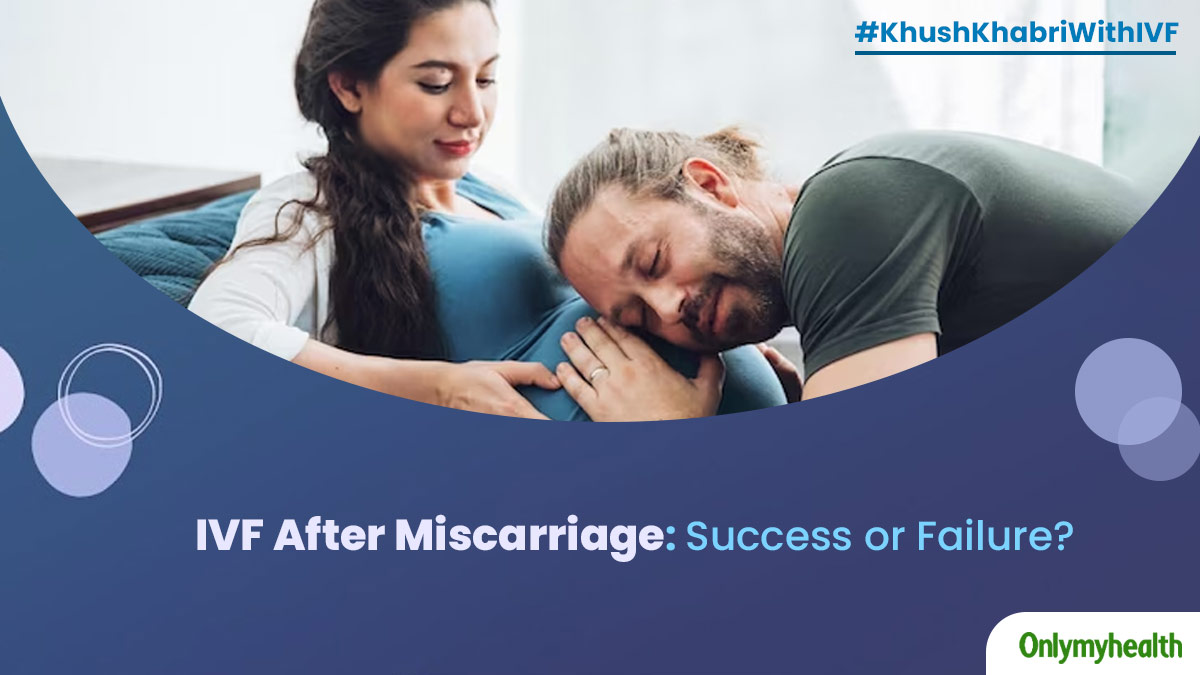
#KhushKhabriWithIVF: There can never be any incident as devastating as a miscarriage for any couple. It can leave them with feelings of grief, loss, and hopelessness. In many cases, couples who have experienced miscarriage may turn to in vitro fertilisation (IVF) as a means to conceive a healthy baby. Through OnlyMyHealth’s ‘KhushKhabri With IVF’ series, we raise and answer common queries related to IVF. In this article, Dr. Parul Gupta, Infertility Specialist in Nova IVF Fertility, Rajouri Garden shares possible options available to couples who are considering IVF after a miscarriage.
Table of Content:-
Understanding Miscarriage and IVF
Miscarriage or spontaneous abortion is the loss of a pregnancy before the 20th week. It is a common experience for women, with up to 25% of pregnancies ending in miscarriage. Miscarriage can be caused by a variety of factors, including genetic abnormalities, hormonal imbalances, and structural issues in the uterus.
IVF or In-Vitro Fertilisation is a fertility treatment in which eggs of a woman and sperm of a man are fertilised in a laboratory. The fertilised egg or embryo is then implanted to the uterus of the woman. IVF can help couples who have difficulty conceiving due to various fertility issues, including age-related infertility, low sperm count, and blocked fallopian tubes.
IVF After Miscarriage: The Options
IVF is emerging as one of the best fertility treatments to help couples conceive. While this is indeed great for infertile couples, should couples experiencing miscarriage consider IVF or not? We questioned Dr. Parul Gupta and she shared some important tips that may be helpful for you. Continue reading to know.
Waiting Period

After a miscarriage, couples may need to wait for a certain period before they can consider IVF. This statement is also backed by a study published in NCBI. This waiting period can range from a few weeks to several months, depending on the circumstances of the miscarriage. Waiting periods allow the body to recover from the physical and emotional trauma of the miscarriage, and give couples time to process their grief.
Also Read: Time Gap In IVF Cycles: Wait Period Before You Try Again After An Unsuccessful Attempt
Preimplantation Genetic Testing
Couples who have experienced recurrent miscarriages may benefit from pre-implantation genetic testing (PGT). PGT is a diagnostic procedure that involves the testing of embryos for genetic abnormalities before they are transferred into the uterus. PGT can identify chromosomal abnormalities that may have caused previous miscarriages and increase the chances of a successful pregnancy.
Frozen Embryo Transfer

Couples who have undergone IVF in the past and have frozen embryos can opt for a frozen embryo transfer (FET) after a miscarriage. FET involves thawing the frozen embryos and transferring them into the uterus. FET is a less invasive and more cost-effective option than a fresh IVF cycle and can increase the chances of a successful pregnancy.
Also Read: Different In Vitro Fertilisation (IVF) Techniques That Couples Should Know
Gestational Carrier
Couples who have experienced recurrent miscarriages or have other fertility issues may consider using a gestational carrier (GC) to carry their baby. A gestational carrier is a woman who agrees to the implantation of the embryo to her uterus and carry the pregnancy for another couple. The embryo is created using the couple's eggs and sperm or donor eggs and sperm, and then transferred into the gestational carrier's uterus. This option is often used when the woman is unable to carry a pregnancy due to medical reasons.
Donor Eggs or Sperm
Couples who have experienced recurrent miscarriages due to genetic abnormalities may consider using donor eggs or sperm. Donor eggs or sperm can be used in conjunction with IVF to create embryos that are free of genetic abnormalities. This option can increase the chances of a successful pregnancy and a healthy baby.
IVF is a viable option for couples who have experienced recurrent miscarriages or have other fertility issues. Understanding the options available after a miscarriage can help couples make an informed decision about their fertility treatment. It is important to work closely with a fertility specialist to determine the best course of action for each individual couple's unique situation. With the right treatment and support, couples can increase their chances of having a healthy baby after experiencing a miscarriage.
Also watch this video
How we keep this article up to date:
We work with experts and keep a close eye on the latest in health and wellness. Whenever there is a new research or helpful information, we update our articles with accurate and useful advice.
Current Version